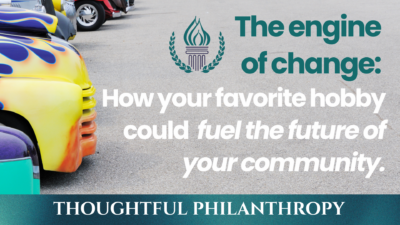
Because immediate families often gather for the holidays — and especially if adult children living away are visiting — this time of year lends itself to conversations about personal or family finances, generosity, and especially philanthropy. Not to steal away the joy of the season, but these discussions, either comprehensive or brief, can pay dividends, so to speak, for 2023 and even decades beyond.
Timely conversation starters can include:
- Were 2022 savings goals reached?
- Are employer-provided benefits being fully matched or used?
- How to make the most of a down year in the market?
- What effects are inflation having?
- And last but not least, against that overall financial backdrop, what causes are you most passionate about and want to support or continue supporting?
For some, a big-picture conversation about family philanthropy may be in order.
For generations, community foundations have served families’ formal needs for philanthropy. And indeed, it is generational wealth — the passing of the torch — that often provides lasting sustenance to a preferred cause or organization.
In Putting Wealth to Work, author Joel L. Fleishman writes, “Where the genes and values of founding individuals or families are strong enough, families can not only endure but can blossom in pursuing a kind of philanthropy that adapts well to changing time while preserving the essential focus of their founders.” Referring to the rewards and fulfillment of family investment, he quotes the late Ford Foundation officer Paul Yivisaker as saying, “There is something distinctive and precious about family foundations that suggests they should remain as they are: a unique opportunity for families to make and leave their mark on society around them, to share with others the fortune they have enjoyed and the creative energies they so often possess.”
Family finance conversations — be they about budgeting or philanthropy — can occur anytime, and the younger the better to build a knowledge base. Accordingly, we offer a list of books suitable for all age ranges, and we've included the published descriptions and a few reviews. We hope you and your family will discover new reading material to feed the lifelong learning and giving process.
Raising Charitable Children by Carol Weisman: Giving is the necessary counterbalance to getting, according to Carol Weisman, MSW, CSP, MOM. Otherwise, she says, most children will grow up thinking only of themselves. This realization is what led her to write Raising Charitable Children, where she shares real-life stories collected from all over the world of how parents, grandparents, aunts, uncles, teachers, scout leaders, friends, next door neighbors, and her own family have either initiated or supported ways to teach children how to give back to those in need.
Family Philanthropy Navigator: The Inspirational Guide for Philanthropic Families on Their Giving Journey: Offers an easy-to-use, step-by-step inspirational guide for new and legacy philanthropic families to initiate or enhance their giving journey. The book speaks to the highly rewarding ways that individuals and families can make a difference in a rapidly changing world. Steps cited to ensure meaningful and impactful giving include:
- Understanding the importance of philanthropy as an integral part of your family enterprise or ecosystem.
- Exploring the motivation, focus and ambitions of your giving.
- Selecting the people and organizations you wish to partner with.
- Deciding on resources, structures and processes you need to achieve impact.
- Learning from the stories of active philanthropists to inspire and inform your giving.
- Preparing thoroughly to begin your own philanthropic journey or to change the direction of your giving.
Creating Change Through Family Philanthropy: The Next Generation: Explains how young people can use privilege to better society. Based on the authors’ experiences with Resource Generation, a national nonprofit working with wealthy young progressives, the book makes the case for financially addressing urgent social and economic issues. It frames controversial topics from power dynamics to grants payout in an accessible way, offering next-generation readers the tools they need to transform their funds. Drawing on more than 40 interviews, this is an essential guide for both young philanthropists and anyone working with wealthy families interested in learning a point of view on ethical giving.
Generation Impact: How Next Gen Donors Are Revolutionizing Giving: Released in 2017 and since updated, authors and philanthropy experts Sharan Goldseker and Michael Moody provide a contemporary view of how today's donors are measuring successful giving through impact. Going beyond prior generations’ knack of giving for the sake of generosity or recognition, the authors focus on intergenerational giving and offer a series of best practices for families.
A Kid’s Guide to Giving by Freddi Zeiler: A comprehensive guide to giving money, volunteering, donating goods, and organizing charity events, this book includes listings of charitable organizations in three categories—People, Animals, and Environment—that make it easy for kids to get involved in the charities that mean the most to them and make a difference in the world.
Wealth in Families by Charles W. Collier: "Charles W. Collier, a Harvard University fundraiser, offers a philosophical look at the meaning and purpose of wealth, in the hope of helping readers–especially those with substantial financial means–to explore family issues, shape their philanthropy, and make wise giving decisions. Wealth in Families builds on the premise that wealth is not just financial–it's also defined in human, intellectual, and social dimensions." - The Chronicle of Philanthropy
Strangers in Paradise: How Families Adopt to Wealth Across Generations: Surprising to many, wealthy people often come from middle-class or working-class backgrounds. Born and raised in modest economic circumstances, they find themselves as adults in the wonderful but unfamiliar world of wealth, like immigrants to a new land. Whether their wealth came from spending long careers at companies with generous savings plans or their own successful entrepreneurial exits, the adjustment is often harder than they anticipate. Yet awaiting wealth’s newcomers is an even more daunting task: how to raise children and grandchildren successfully in the family’s new world of affluence. Strangers in Paradise takes an innovative approach to the challenges facing wealth’s “immigrants and natives.” Combining clear reasoning with real-world stories, the book outlines for the first time how the key process for families of wealth—like all immigrant families—is adaptation.
In the season of giving, teaching or learning how to give may be the best gift of all. The team at the PACF is here to help you and your family make the most out of your charitable giving to support the causes you love and build even stronger ties across family generations.




